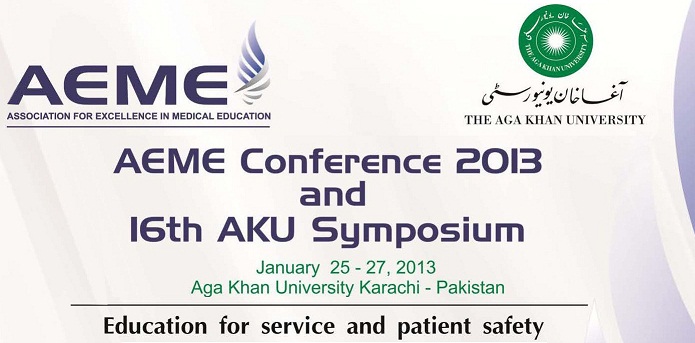Day 1 : Oral Presentations (Theme: Curriculum - Teaching & Learning)
Task-based learning versus problem-oriented lecture in Neurology CME of general practitioners to assess improvement in understanding and clinical reasoning skills - a quasi experimental study
Location
AKU Auditorium
Start Date
26-1-2013 3:50 PM
Abstract
Background: Determine the impact of task-based learning versus problem-oriented lecture in terms of improved understanding and clinical reasoning skills of general practitioners in CME on Headache disorders.
Methods: Methodology TBL group consisted of 30 self-selected general practitioners divided into10 small groups with case-based specific tasks and explicitly defined outcomes. The lecture group consisted of 29 physicians who completed pre/post-test. TBL session was split in two; morning period was based on exploring, constructing, integrating learning and experiences into a PowerPoint presentation. Subsequent session was followed by sharing of information to large group. The lecture group had a problem-oriented lecture. Understanding and clinical reasoning skills of all participants were assessed through a thirty minute pre/post-test, which consisted of 20 one best type multiple choice questions. Reliability coefficient of pre/post-test scores of both groups was calculated through Cronbach’s Alpha. Paired T– test was used to determine the statistical significance between pre/post-test scores. Independent –T test was used to compare the impact of two teaching methods on physicians learning.
Results: The data was analyzed using IBM SPSS Statistics19. Reliability coefficient of pre/post-test scores was (lecture group=0.672; TBL group= 0.881). Paired T- test statistics depicted lecture group pre/post-test mean scores as (9 SD 3 vs. 12.4 SD 2.6; p
Conclusions: Improvement in participant scores in both educational interventions was clearly noticed. We conclude that both problem-oriented lecture & task-based interventions were equally effective and resulted in statistically insignificant difference, so could be considered as vital teaching tools in continuing medical education. Indeed, TBL groups’ some edge over lecture group in terms of post-test mean scores, favour TBL’s further exploration in longitudinal studies in the context of CME.
Key words: Task-based learning; problem-oriented lecture; Problem-based learning; general practitioners
Task-based learning versus problem-oriented lecture in Neurology CME of general practitioners to assess improvement in understanding and clinical reasoning skills - a quasi experimental study
AKU Auditorium
Background: Determine the impact of task-based learning versus problem-oriented lecture in terms of improved understanding and clinical reasoning skills of general practitioners in CME on Headache disorders.
Methods: Methodology TBL group consisted of 30 self-selected general practitioners divided into10 small groups with case-based specific tasks and explicitly defined outcomes. The lecture group consisted of 29 physicians who completed pre/post-test. TBL session was split in two; morning period was based on exploring, constructing, integrating learning and experiences into a PowerPoint presentation. Subsequent session was followed by sharing of information to large group. The lecture group had a problem-oriented lecture. Understanding and clinical reasoning skills of all participants were assessed through a thirty minute pre/post-test, which consisted of 20 one best type multiple choice questions. Reliability coefficient of pre/post-test scores of both groups was calculated through Cronbach’s Alpha. Paired T– test was used to determine the statistical significance between pre/post-test scores. Independent –T test was used to compare the impact of two teaching methods on physicians learning.
Results: The data was analyzed using IBM SPSS Statistics19. Reliability coefficient of pre/post-test scores was (lecture group=0.672; TBL group= 0.881). Paired T- test statistics depicted lecture group pre/post-test mean scores as (9 SD 3 vs. 12.4 SD 2.6; p
Conclusions: Improvement in participant scores in both educational interventions was clearly noticed. We conclude that both problem-oriented lecture & task-based interventions were equally effective and resulted in statistically insignificant difference, so could be considered as vital teaching tools in continuing medical education. Indeed, TBL groups’ some edge over lecture group in terms of post-test mean scores, favour TBL’s further exploration in longitudinal studies in the context of CME.
Key words: Task-based learning; problem-oriented lecture; Problem-based learning; general practitioners

